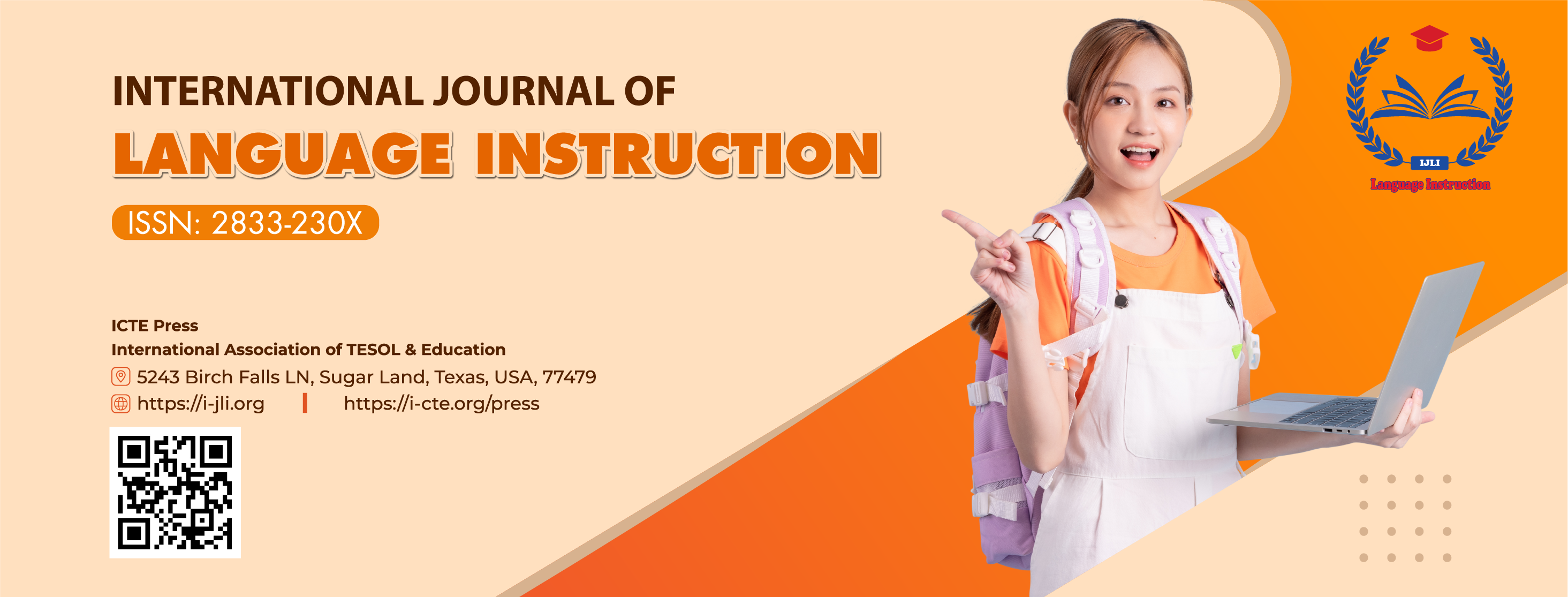An Investigation into Perception of Online Teaching and the Challenges of Online Teaching Faced by English Lecturers at Quang Trung University during COVID-19 Outbreak
DOI:
https://doi.org/10.54855/ijli.23233Keywords:
Teachers’ perception, online teaching, challengesAbstract
Universities worldwide have shifted from face-to-face to online teaching due to the effects of the Covid-19 pandemic, and Quang Trung University in Quy Nhon City was not an exception. However, there has yet to be research on online teaching at the university. This research was conducted to fill this gap. The authors conducted the study to investigate teachers' perceptions and problems when teaching online. Seven English lecturers at the university were asked to fill in a semi-structured questionnaire and attend interviews afterward. The findings showed that most lecturers were satisfied with online classes and encountered some difficulties, including how to motivate and communicate with their university students effectively and lack of technical skills as well as technical issues. In this article, researchers have provided an overview of lecturers' perceptions and some obstacles to online teaching; therefore, teachers may overcome difficulties and attain effectiveness when teaching online.References
Abhinandan, K., & Anupama, N. (2020). A study on the perception of teachers and students toward online classes in Dakshina Kannada and Udupi District. Asian Association of Open Universities Journal, 15(3), 285-296. Doi: https://doi.org/10.1108/AAOUJ-07-2020-0047.
Ajit, K. R. (2020). A Comprehensive Guide for Design, Collection, Analysis and Presentation of Likert and other Rating Scale Data. Amazon: Publisher.
Cavanaugh, D. (2005). Teaching online – A time comparison. Online Journal of Distance Learning Administration, 8, 1-9.
Cleaver, S. (2014). Technology in the Classroom: Helpful or Harmful? Retrieved from http://www.education.com/magazine/article/effective-technology-teaching-child/
Dinh, T. H. T. (2023). The Effect of Video Clips on Students’ Speaking Performances. International Journal of Language Instruction, 2(1), 40–50. https://doi.org/10.54855/ijli.23214
Dja’far, V.H., Cahyono, B.Y. and Bashtomi, Y. (2016). EFL teachers’ perception of university students’ motivation and ESP learning achievement. Journal of Education and Practice, 7(14), 28-37.
Ertmer, P.A., Ottenbreit-Leftwich, A., Sadik, O., Sendurur, E., & Sendurur, P. (2012). Teachers’ beliefs and technology integration practices: A critical relationship. Computers & Education, 59, 423-435.
Farrah, M. & Al-Bakry, G. H. (2020). Online learning for EFL students in Palestinian universities during Corona pandemic: Advantages, challenges, and solutions. Indonesian Journal of Learning and Instruction, 3(2), 65-78. doi: https://doi.org/10.25134/ijli.v3i2.3677
Gustiani, S. (2020). Students’ Motivation in Online learning during Covid-19 Pandemic Era: A case study. Holistics Journal, 12(2), 23-40.
Hughes, J. (2005). The role of teacher knowledge and learning experiences in forming technology-integrated pedagogy. Journal of technology and teacher education, 13(2), 277-302.
Hung, M., Chou, C., Chen, C. & Own, Z. (2010). Learner readiness for online learning: Scale development and student perceptions. Computers & Education, 55, 1080-1090. doi: https://doi.org/10.1016/j.compedu.2010.05.004
Johnson, A. M., Jacovina, M. E., Russell, D. E., & Soto, C. M. (2016). Challenges and solutions when using technologies in the classroom. In S. A. Crossley & D. S. McNamara (Eds.) Adaptive educational technologies for literacy instruction (pp. 13-29). New York: Taylor & Francis. Published with acknowledgment of federal support.
Jorge, I. (2010). Social presence and cognitive presence in an online training program for teachers of Portuguese: Relation and methodological issues. In IODL and ICEM 2010 joint conference and media days, 427–435. Eskisehir, Turkey: Publisher.
Kamal, T. & Illiyan, A. (2021). School teachers’ perception and challenges towards online teaching during Covid-19 pandemic in India: an econometric analysis. Asian Association of Open Universities Journal, 16(3), 311-325. doi: https://doi.org/10.1108/AAOUJ-10-2021-0122
Knowles, E. & Kerkman, D. (2007). An investigation of students’ attitude and motivation toward online learning. Insight: A Collection of Faculty Scholarship-Student Motivation, 2, 70-80.
Larreamendy-Joerns, J. & Leinhardt, G. (2006). Going the Distance with Online Education. Review of Educational Research, 76(4), 567-605. doi: https://doi.org/10.3102/00346543076004567
Lee, K., Fanguy, M., Bligh, B., & Lu, S. X. (2022). Adoption of online teaching during the Covid-19 pandemic: a systematic analysis of changes in university teaching activity. Education Review, 74(3), 460-483.
Likert, R. (1932). A Technique for the Measurement of Attitudes. Archives of Psychology, 140, 1–55. Retrieved from https://legacy.voteview.com/pdf/Likert_1932.pdf.
Mahyoob, M. (2020). Challenges of e-Learning during the COVID-19 Pandemic Experienced by EFL Learners. Arab World English Journal, 11(4), 351-362. https://dx.doi.org/10.24093/awej/vol11no4.23
McLeod, S. A. (2019). Likert scale. Simply Psychology. Retrieved from www.simplypsychology.org/likert-scale.html
Merriam, S. B. (2004). The role of cognitive development in Mezirow’s transformational learning theory. Adult Education Quarterly, 55(1), 60-68. doi: https://doi.org/10.1177/0741713604268891
Merriam, S.B. (1998). Qualitative Research and Case Study Applications in Education. San Francisco, Jossey-Bass Publishers.
Nugroho, A., Ilmiani, D., & Rekha, A. (2020). EFL Teachers' Challenges and Insights of Online Teaching amidst Global Pandemic. Metathesis: Journal of English Language Literature and Teaching, 4(3), 277-291. doi: https://doi.org/10.31002/metathesis.v4i3.3195
Pham, M. T., Luu, T. T. U., Mai, T. H. U., Thai, T. T. T., & Ngo, T. C. T. (2021). EFL Students' Challenges of Online Courses at Van Lang University during the COVID-19 Pandemic. International Journal of TESOL & Education, 2(2), 1-26. doi: https://doi.org/10.54855/ijte.22221
Pham, N. S. (2022). The Effectiveness of Teaching and Learning Online: A Study on HUFI English-majored Students. International Journal of TESOL & Education, 2(3), 1-12.
Nguyen, T. D. T., & Pham, V. P. H. (2022). Effects of Using Technology to Support Students in Developing Speaking Skills. International Journal of Language Instruction, 1(1), 1–8. https://doi.org/10.54855/ijli.22111
Rakes, G. C., & Casey, H. B. (2002). An analysis of teacher concerns toward instructional technology. International Journal of Educational Technology, 3(1). https://ascilite.org/archived-journals/ijet/v3n1/rakes/
Retno, P. R., & Yanty, W. (2020). Teachers’ Perception of Online Learning during Pandemic Covid-19. Journal Penelitian Pendidikan, 20(3), 392 – 406. Retrieved from https://ejournal.upi.edu/index.php/JER/article/view/29226/13768
Richardson, J. C., Besser, E., Koehler, A., Lim, J., & Strait, M. (2016). Instructors’ Perceptions of Instructor Presence in Online Learning Environments. The International Review of Research in Open and Distributed Learning, 17(4). doi: https://doi.org/10.19173/irrodl.v17i4.2330
Salma, D., Ariani, D., & Handoko, H. (2013). Mozaik Teknologi Pendidikan: ELearning. Jakarta: PT Fajar Interpratama Mandiri, 2103.
Sangeeta & Tandon, U. (2020). Factors influencing adoption of online teaching by school teachers: a study during COVID-19 pandemic. Journal of Public Affairs, 1-11. doi: https://doi.org/10.1002/pa.2503
Sareen, S. & Nangia, A. (2020). Online teaching during Covid 19: Attitude and challenges faced by school teachers”. International Journal of Disaster Recovery and Business Continuity, 11(1). 3012-3018. doi: https://doi.org/10.1016/j.iheduc.2011.11.006
Satar, H. M., & Akcan, S. (2018). Pre-service EFL teachers’ online participation, interaction, and social presence. Language Learning & Technology, 22(1), 157–183. https//dx.doi.org/10125/44586
Singh, V., & Thurman, A. (2019). How Many Ways Can We Define Online Learning? A Systematic Literature Review of Definitions of Online Learning (1988-2018). American Journal of Distance Education, 33(4), 289-306.
Swan, K., & Shih, L. F. (2005). On the nature and development of social presence in online course discussions. Journal of Asynchronous Learning Networks, 9 (3), 115–136. doi: https://doi.org/10.1.1.102.5653
Tabiri, M. O., Jones-Mensah, I., Fenyi, D. A., & Asunka, S. (2022). Challenges of online learning of English/French language in higher education in Ghana. Journal of Language and Linguistic Studies, 18(1), 207-222. doi: https://doi.org/10.52462/jlls.176
Tao, Y. (2009). The Relationship Between Motivation And Online Social Presence In An Online Class. Electronic Theses and Dissertations, 2004-2009. 3871. Retrieved from https://stars.library.ucf.edu/etd/3871.
Tu, C. H., & McIsaac, M. (2002). The relationship of social presence and interaction in online classes. The American Journal of Distance Education, 16 (3), 131–150. doi: https://doi.org/10.1207/S15389286AJDE1603_2
Xhaferi, B., & Xhaferi, G. (2020). Online learning benefits and challenges during the Covid-19 pandemic-Students’ perspective from SEEU. SEEU Review, 15(1), 86-103. doi: https://doi.org/10.2478/seeur-2020-0006
Yazdi, M. (2012). E-learning sebagai media pembelajaran interaktif berbasis teknologi informasi. Journal Ilmiah Foristek, 2(1), 143-152.
Yuhanna, I., Alexander, A., & Kachik, A. (2020). Advantages and Disadvantages of Online Learning. Journal Educational Verkenning, 1(2), 13-19. doi: https://doi.org/10.48173/jev.v1i2.54
Downloads
Published
Issue
Section
License
Copyright (c) 2023 Vo Thi Thu Suong, Le Thi My Nho

This work is licensed under a Creative Commons Attribution 4.0 International License.
The copyright of all articles published in the International Journal of Language Instruction (ijli) remains with the Authors, i.e. Authors retain full ownership of their article. Permitted third-party reuse of the open access articles is defined by the applicable Creative Commons (CC) end-user license which is accepted by the Authors upon submission of their paper. All articles in the ijli are published under the CC BY-NC 4.0 license, meaning that end users can freely share an article (i.e. copy and redistribute the material in any medium or format) and adapt it (i.e. remix, transform and build upon the material) on the condition that proper attribution is given (i.e. appropriate credit, a link to the applicable license and an indication if any changes were made; all in such a way that does not suggest that the licensor endorses the user or the use) and the material is only used for non-commercial purposes.
Authors are able to enter into separate, additional contractual arrangements for the non-exclusive distribution of the journal's published version of the work (e.g., post it to an institutional repository, in a journal or publish it in a book), with an acknowledgment of its initial publication in this journal.











